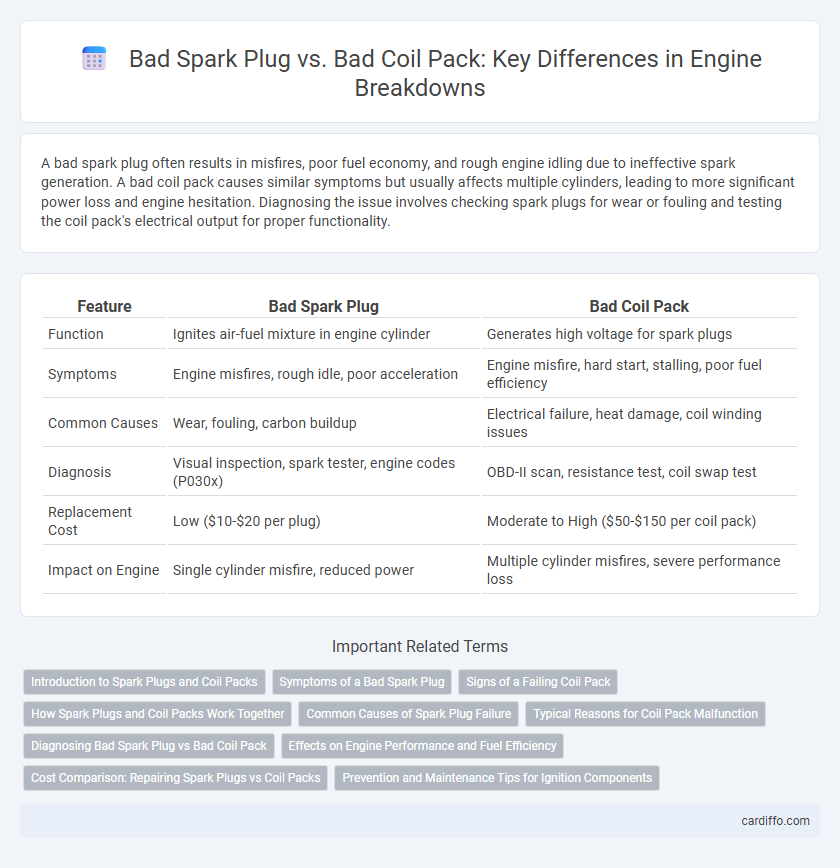A bad spark plug often results in misfires, poor fuel economy, and rough engine idling due to ineffective spark generation. A bad coil pack causes similar symptoms but usually affects multiple cylinders, leading to more significant power loss and engine hesitation. Diagnosing the issue involves checking spark plugs for wear or fouling and testing the coil pack's electrical output for proper functionality.
Table of Comparison
| Feature | Bad Spark Plug | Bad Coil Pack |
|---|---|---|
| Function | Ignites air-fuel mixture in engine cylinder | Generates high voltage for spark plugs |
| Symptoms | Engine misfires, rough idle, poor acceleration | Engine misfire, hard start, stalling, poor fuel efficiency |
| Common Causes | Wear, fouling, carbon buildup | Electrical failure, heat damage, coil winding issues |
| Diagnosis | Visual inspection, spark tester, engine codes (P030x) | OBD-II scan, resistance test, coil swap test |
| Replacement Cost | Low ($10-$20 per plug) | Moderate to High ($50-$150 per coil pack) |
| Impact on Engine | Single cylinder misfire, reduced power | Multiple cylinder misfires, severe performance loss |
Introduction to Spark Plugs and Coil Packs
Spark plugs ignite the air-fuel mixture within the engine cylinders, crucial for combustion and engine performance. Coil packs generate the high voltage needed to create a spark at the spark plugs, ensuring efficient ignition. A malfunctioning spark plug often causes misfires or poor fuel economy, while a faulty coil pack can lead to complete ignition failure or engine stalling.
Symptoms of a Bad Spark Plug
Symptoms of a bad spark plug include engine misfires, rough idling, and reduced fuel efficiency due to incomplete combustion. You may also experience difficulty starting the engine, noticeable power loss during acceleration, and increased exhaust emissions. Regular inspection and timely replacement of spark plugs can prevent further engine damage and maintain optimal performance.
Signs of a Failing Coil Pack
Signs of a failing coil pack include engine misfires, rough idling, and a noticeable decrease in power and acceleration. Drivers may experience difficulty starting the vehicle and a sharp drop in fuel efficiency due to incomplete combustion. Warning lights such as the Check Engine Light often illuminate when coil packs malfunction, signaling the need for diagnostic testing and immediate replacement.
How Spark Plugs and Coil Packs Work Together
Spark plugs and coil packs work together to deliver the spark needed for combustion in an engine. The coil pack generates high-voltage electricity, which the spark plug uses to ignite the air-fuel mixture inside the cylinder. A bad spark plug can cause misfires by failing to create a proper spark, while a bad coil pack can prevent electricity from reaching the spark plug effectively.
Common Causes of Spark Plug Failure
Common causes of spark plug failure include carbon fouling from excessive fuel or oil, electrode wear due to normal use, and improper heat range selection leading to overheating or fouling. Contaminants such as oil leaks or deposits can cause misfires, reducing engine performance and fuel efficiency. In contrast, a bad coil pack typically causes ignition problems by failing to generate the necessary voltage, highlighting the importance of regularly inspecting spark plugs for wear and contamination.
Typical Reasons for Coil Pack Malfunction
Coil pack malfunctions typically result from overheating, electrical shorts, or moisture intrusion, which disrupt the ignition system's ability to generate the high voltage needed for spark plugs. Unlike bad spark plugs that exhibit fouling or electrode wear, faulty coil packs often cause engine misfires, rough idling, or difficulty starting due to insufficient spark generation. Regular inspection of ignition coils for cracks, corrosion, and proper electrical connections helps prevent breakdowns associated with coil pack failures.
Diagnosing Bad Spark Plug vs Bad Coil Pack
Diagnosing a bad spark plug involves checking for symptoms like engine misfires, rough idling, and poor fuel economy, often confirmed by inspecting the plug for carbon deposits or wear. A bad coil pack typically causes similar misfires but can be identified by testing for weak or no spark output using a multimeter or coil tester. Comparing diagnosis results helps isolate whether the ignition issue is due to faulty spark plugs or a malfunctioning coil pack.
Effects on Engine Performance and Fuel Efficiency
A bad spark plug causes misfires, rough idling, and decreased acceleration, leading to poor engine performance and increased fuel consumption. A faulty coil pack results in weak or inconsistent spark delivery, causing multiple cylinder misfires, reduced power output, and significant fuel efficiency loss. Both issues disrupt combustion efficiency but coil pack problems typically have a more severe impact on overall engine functionality and mileage.
Cost Comparison: Repairing Spark Plugs vs Coil Packs
Repairing spark plugs typically costs between $50 and $150, depending on the vehicle and labor fees, while replacing a coil pack ranges from $150 to $300 or more due to higher parts and labor expenses. Spark plug maintenance often extends engine life and improves fuel efficiency at a lower cost compared to coil pack replacement, which is more complex and critical for engine performance. Prioritizing spark plug repairs can be a cost-effective solution, but persistent ignition issues usually necessitate coil pack replacement to prevent further engine damage.
Prevention and Maintenance Tips for Ignition Components
Regularly inspecting spark plugs and coil packs for wear and damage can prevent ignition system failures and costly breakdowns. Using high-quality ignition components, maintaining proper gap settings, and replacing parts according to the manufacturer's recommended intervals optimize engine performance and reliability. Keeping the ignition system clean and dry while avoiding exposure to excessive heat or moisture extends component lifespan and reduces the risk of misfires.
Bad spark plug vs bad coil pack Infographic

 cardiffo.com
cardiffo.com